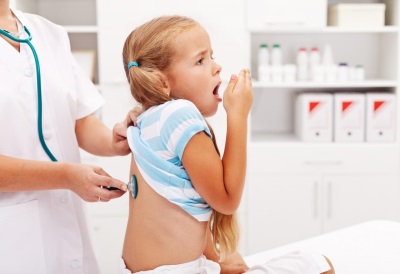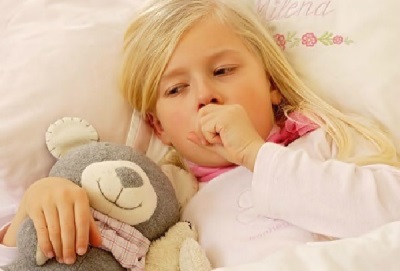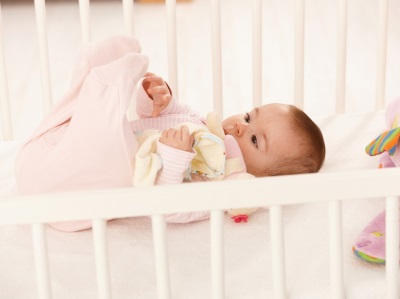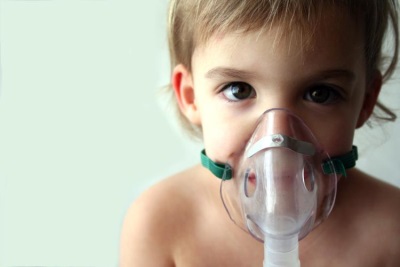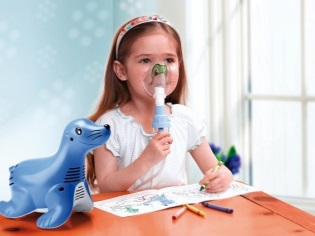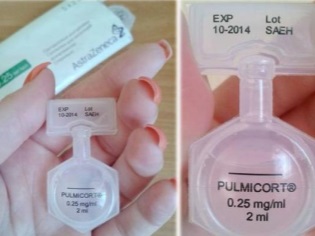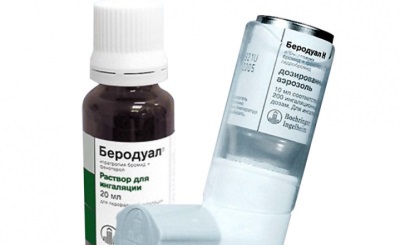Allergic cough in a child: symptoms and treatment
Cough in children is most often caused by respiratory tract infections caused by viruses or pathogenic bacteria. However, allergy can be a fairly common cause of coughing.
How to recognize: additional symptoms
The fact that the nature of cough, most likely, allergic, can suggest the following features of this symptom:
- Allergy coughs are often barking and dry.
- Such a cough appears in a child suddenly in the form of attacks.
- Cough is often protracted and lasts up to two to three weeks.
- Temperatures with such a cough, as a rule, does not happen.
- Cough often appears at night.
Cough is often not the only symptom of an allergic reaction. In addition to coughing a baby can be:
- Runny nose
- Sneezing
- Tickling and itching in the throat and nasopharynx.
- Teariness.
- Discomfort after coughing.
- Pain when inhaling.
Differences between allergic cough and cough with bronchitis or whooping cough
Allergic cough is similar to coughing that occurs with whooping cough or acute bronchitis. Often it is a dry cough, which is called barking. The phlegm with it is difficult to separate, and before the attack, the child may feel suffocated (complains of lack of air) caused by swelling of the mucous membranes of the respiratory tract.
Unlike cough caused by infection, the general condition of the child is almost not disturbed, and the body temperature remains within the normal range. In addition, a cough of an allergic nature can often be associated with the action of an allergen, for example, it occurs during the flowering period of certain plants, after sleeping on a pillow with down or after talking with a pet.
The difference in allergic cough from infectious also stands for the effectiveness of the use of antiallergenic drugs. If you give such a drug to a child, the intensity of allergic cough immediately decreases to the full relief of the attack.
Cough type
Dry
In most cases, the child with allergies suffers from dry cough. Such a cough exhausts the baby, can last for a long time in the form of attacks and very often manifests itself at night. In many cases, the appearance of cough note systematic, for example, it occurs in the spring or winter.
Wet
Wet cough of an allergic nature is much rarer dry. If sputum is excreted when you cough due to an allergic reaction, it is clear and does not contain pus. Because of the transparency and high viscosity, it is called vitreous.
Diagnostics
With a long dry cough of the child, it is important to show the pediatrician. The doctor will confirm the absence of an infectious cause of coughing and will recommend examinations that will help identify allergens. The child will do:
- Complete blood count (pay attention to the number of eosinophils).
- Blood chemistry.
- Determination of the level of IgE in the blood.
- X-ray examination of the chest.
- Sputum analysis (with a wet cough).
- Samples that determine the function of respiration.
- Skin tests for allergens (in children over 3 years).
- ELISA test for allergens.
How to treat?
Since the occurrence of allergic cough results from the ingestion of a particular allergen into the child’s body, the basis for treating such a symptom is to get rid of this allergen, as well as stopping the body’s reaction.
If food allergies are the cause, cough-provoking products are removed from the diet.
Dust is a frequent allergen, so when allergic coughing appears, it is important to regularly ventilate the room and carry out wet cleaning.
If you are allergic to a pet, you should decide about his contact with the child.
Drugs for treatment
Medicines prescribed for children with allergies, are a group of antihistamines. These include:
- Zyrtec - drops are applied from 6 months, tablets - from 6-year-old age.
- Ketotifen - syrup from 6 months of age, pills - from 3 years.
- Zodak - drops are allowed from the year, pills - from 6 years.
- Erius - syrup is prescribed to one-year-old children and older, and tablets - from 12 years.
- Tsetrin - syrup is given from 2 years, tablets - to children older than 6 years.
- Fenistil - drops give to children older than 1 month.
- Suprastin - used from 1 month.
In addition to antihistamines, sorbents can be given to the child, for example, Enterosgel, activated carbon or Polysorb, as well as drugs that relax the bronchi.
How to remove a coughing fit?
To quickly eliminate the attack apply modern antihistamines drugs. At the same time, we note that only a doctor needs to find the right tool that will help your child. Suprastin is often used, since the injection of this drug helps to remove the cough in 5-10 minutes (the tablets last a little longer — about 20 minutes).
If allergic symptoms are caused by exposure to pollen or dust, the condition of the child can improve the spray that is injected into the baby’s nose. These may be drugs. Cromohexal (from the age of 5), Levocabastine (from the age of 6), Allergodil (from the age of 6).
How to make inhalation?
Quickly cope with an allergic cough capable of inhalation, for which use nebulizer.
In the apparatus, you can pour a saline solution or mineral water. This procedure will moisten the mucous membrane of the respiratory tract, which will ease the cough.
There are also inhalation forms of drugs that affect the bronchi.
With pulmicort
This drug is a hormonal drug that is often used for asthma and other diseases of the respiratory system in which breathing is difficult. He noted the ability to relieve bronchial edema, reduce inflammation and prevent spasm of smooth muscles of the bronchial tree.
Before you do inhalation with pulmicort, you should consult with your doctor, because the dose for each child is selected individually. The drug is prescribed from 6 months of age. The right amount of medicine is diluted with saline, poured into the nebulizer and carry out the procedure, the effect of which will be noticeable within ten minutes.
With Berodual
The drug is used for dry allergic cough, in which the sputum is very viscous. Its main effect is the expansion of the bronchi due to the relaxation of their smooth muscles. Before using it, consult a pediatrician to determine the correct dosage. The drug in the right dose diluted with saline to get 4 ml of solution. Bay it in a nebulizer, give inhale the child. The procedure is repeated 4 times a day.
Opinion Komarovsky
The well-known pediatrician emphasizes that only a specialist can figure out whether a prolonged cough for several weeks or months is caused by allergies or is caused by a sluggish infection.However, in acute manifestations of allergy, parents are able to distinguish it from infection on their own.
Komarovsky emphasizes that poor appetite, drowsiness and lethargy, as well as an increase in temperature should push the parents to the idea of infection. Moreover, with ARVI, the symptoms will not be limited to coughing. The child will complain of a runny nose, pain when swallowing or headaches.
If there is no fever or other manifestations of the infection, and the general condition has practically not changed, Komarovsky advises parents to reflect on what preceded the disease. Did the child go to a new place (to visit or to the dacha), did the parents buy something new, did they not treat the child with an unfamiliar dish, did they change the brand of household chemicals, and so on. According to Komarovsky, allergies should also be thought about if only a child is sick, and all other family members are healthy.
For more on this, see the transfer of Dr. Komarovsky.
Folk remedies
- Several times a day, especially when returning home after a walk, it is advised to rinse the nasopharynx, mouth and throat with warm water. In the water, you can add sea salt in a small amount.
- If the child does not have allergies on honey, you can do folk remedy based on bay leaf. The leaves (8-10 pieces) are boiled for 5 minutes in half a liter of water, then added to them in a tablespoon of baking soda and honey. When coughing attacks occur, 1/4 cup per day is given.
- Cook your child with an allergic cough syrup from garlic (two or three cloves) and sugar or honey. The mixture should be infused for two weeks, after which the syrup is given in the morning on a tablespoon, as well as during coughing fits.
Prevention
The best way to prevent the emergence of allergic cough is to protect the child from possible allergens. Even during the childbearing period, mothers are advised to exclude allergenic foods or limit them significantly. Also pregnant should walk more.
When the child is born, you need to carefully examine his skin and at the first manifestation of diathesis contact a doctor immediately. Such a problem should not be considered a harmless state that will pass by itself and does not require medical intervention.
For how to quickly find a source of allergy, see the transfer of Dr. Komarovsky.
In the child's room should be regularly carried out wet cleaning, and direct contact with pets should be limited. Use hypoallergenic cosmetics and baby-safe household chemicals.
Remember that any allergy symptoms require a reaction from both parents and doctors, since inaction can lead to complications, such as bronchial asthma.

